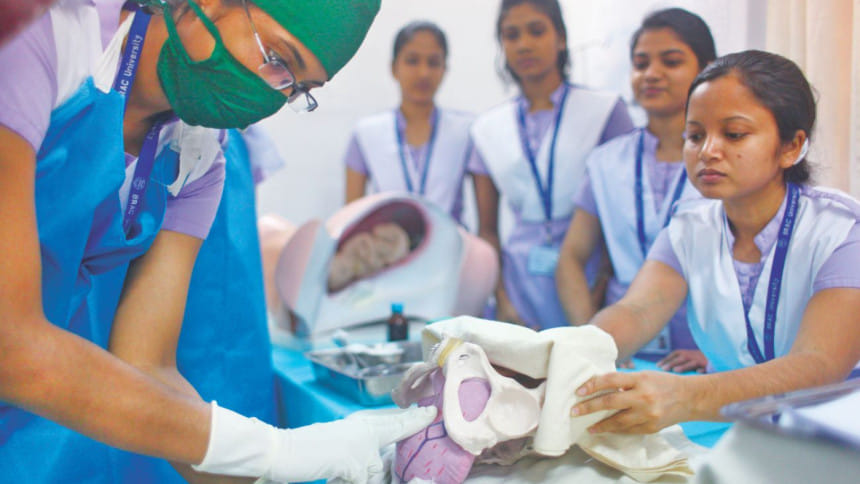A MUCH-NEEDED INITIATIVE

Have you ever visited a maternity ward of a government hospital? Let me paint you a picture. At the hospital, more than 160 pregnant mothers are crammed into a shabby, overcrowded hall, where only 50 beds are available for patients. The rest lie on dirty floors, sharing space with cats and flies. To make matters worse, there are only three doctors and one nurse for all the patients. The nurse, with very little training, delivers babies from experience.
Such poor facilities and unavailability of trained midwives are reasons behind the failing health of both mothers and new born babies in Bangladesh. Many living in the rural areas, in fact, prefer not to take the trouble of taking a pregnant mother to the hospital for a safe delivery. According to a research (BDHS, 2014), 62 percent births are delivered at home, of which 90 percent occur without the assistance of trained personnels. In addition to the above, the maternal and neonatal mortality rate is quite high in the country due to the lack of skilled attendants working during the child delivery process.
In early 2013, BRAC University (BRACU) introduced a three-year diploma programme in midwifery, to develop qualified, competent and professional midwives, to play a significant role in improving maternal health and children's health in Bangladesh.
“BRACU developed a competency based curriculum that meets national and global standards for midwifery education, keeping in mind the skills necessary to provide quality services at the community level," says Ismat Bhuiya, director and founder, BRACU Midwifery Education Programme. "We enrolled a total of 410 students from 279 unions, in the first intake. We strictly maintain 8:1 student-teacher ratio, well equipped classrooms and laboratories to ensure quality education.”
The enrolled students have been given scholarships covering tuition, accommodation, meal plans, course materials and local transportation. The students also enjoy a monthly stipend of BDT 500 for the three academic years. BRACU has been running this diploma programme in six districts in Bangladesh.
“I am a first year student and I come from a commerce background," says Sharmin Akhter, one of the enrolled students. "The well equipped laboratories and regular practical classes guided by our teachers have made this study really enjoyable. I believe that by studying and practicing midwifery, we will be able to contribute a lot to our country,” she comments.
The midwifery programme at BRAC University is undoubtedly a revolutionary step in ensuring safe motherhood. However, our government must come forward to integrate these skilled groups of midwives to the existing system of health services. “The government should ensure options for professional and skilled midwives to practice their skills in the community level," adds Ismat. "Otherwise, the existing conditions of maternal health, in the rural and least developed areas, will not change.”

 For all latest news, follow The Daily Star's Google News channel.
For all latest news, follow The Daily Star's Google News channel. 



Comments